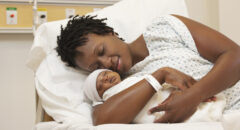 (BlackDoctor.org) — The best place to get information about your sexual health is from your doctor, but for whatever reason—convenience, privacy, or anxiety and urgency—you may one day find yourself searching for answers from other unreliable sources for intimate and important questions.
(BlackDoctor.org) — The best place to get information about your sexual health is from your doctor, but for whatever reason—convenience, privacy, or anxiety and urgency—you may one day find yourself searching for answers from other unreliable sources for intimate and important questions.
It’s great to learn more about your body and your choices, but explore those search results with caution. A lot of information is chock full of errors, omissions, and outdated advice, and that it’s not always easy to find the truth about common myths believed by many.
MYTH: You can catch an STD from a toilet seat
Sexually transmitted diseases or infections can’t live outside the body for a long period of time—especially not on a cold, hard surface like a toilet seat. Plus, they aren’t present in urine, anyway (it’s usually sterile), so the chances of you catching one from whoever used the bathroom before you are slim to none.
What you do need to worry about, however, is what may seem like benign skin-to-skin or mouth-to-mouth contact. Kissing, for example, can spread herpes (and deeper kissing can even spread oral gonorrhea and chlamydia), while skin rubbing together can pass infections such as genital warts, herpes, scabies, and pubic lice.
MYTH: You can’t get pregnant the first time you have sex
It may seem like the odds are in your favor, but there’s no reason to risk it: You are just as likely to get pregnant the first time you have sex as any other. In fact, some statistics say that 20% of people get pregnant within a month of starting sex.
MYTH: You can’t get pregnant during your period
It is unlikely, but still possible—especially if you’re not using a condom or birth control. Some women have long periods that overlap with the beginning of ovulation, which means they can be fertile even though they’re menstruating.
Say you have a short cycle (21 days, for example) and your period lasts a week. If you have sex close to the end of your period, you could become pregnant since sperm can live for up to 72 hours in your reproductive tract.
There’s also the infamous late-in-life pregnancy that can occur during perimenopause, when periods are erratic. Experts say it’s not safe to ditch birth control until you haven’t had a period for a year.
MYTH: Women need a Pap smear when they turn 18
In 2003, the American College of Obstetricians and Gynecologists changed its recommendation for Pap tests, also known as Pap smears; previously, the test was recommended immediately after a woman first has sexual intercourse or at age 18, whichever came first.
Now, Pap tests aren’t recommended until women have been sexually active for about three years, or until they turn 21.
An early Pap test may seem harmless, but the stress of needing a Pap—often thought of as an uncomfortable and invasive procedure—may cause young women to avoid their gynecologist or refrain from asking about birth control. Young women should be able to approach their doctors and discuss these issues without the scrutiny of unnecessary tests.
Why the reason for the change? Most cases of human papillomavirus (HPV) clear up on their own within three years; it’s only the cases that stick around longer—and will be picked up by a later Pap test—that are real causes for concern because they can lead to cervical cancer.
MYTH: The “morning after” pill causes an abortion
Plan B, also known as the “morning after” pill, is not the same as RU-486, a pill that causes an abortion. In fact, if you take Plan B when you’re already pregnant—that is, if a fertilized egg has attached to the wall of your uterus—it won’t make a bit of difference. In previous research, more than 30% of sexually active adolescents said that they believed emergency contraceptives induce abortion.
MYTH: The “morning after” pill is not available to minors without a prescription
As of April 2009, Plan B is available to women ages 17 and up, nationwide, over the counter without a prescription. (You just need to ask the pharmacist.) It has been available over the counter for those 18 and up since 2006, while individual states could make their own rulings about availability to minors.
Nine states—Alaska, California, Hawaii, Maine, Massachusetts, New Hampshire, New Mexico, Washington, and Vermont—have sold and will continue to sell Plan B directly to women of any age.
MYTH: Birth control pills make you gain weight
Although clinical trial after clinical trial has been unable to prove a correlation between oral contraceptives and weight gain, this is still a common belief among women of all ages.
Specifically, a review article published in 2006 analyzed 44 previous trials and found that while some participants did gain weight during their studies, there was no evidence that their birth control was to blame.
One type of contraceptive that may cause weight gain is injectable depot medroxyprogesterone acetate (DMPA), commonly known as the birth control shot. In a study published in March 2009, University of Texas researchers linked the shot to an average 11-pound weight gain over three years.
MYTH: IUD birth control is not safe for use in adolescents
Intrauterine devices (IUDs) are small objects inserted through the cervix and placed in the uterus to prevent pregnancy for up to 12 years. Because you don’t need to take a pill every day when using an IUD, it can be a convenient and long-term way to prevent pregnancy.
Outdated information suggested that IUDs may increase the risk of pelvic inflammatory disease in women under 18.
But as of 2007, ACOG has said that IUDs are a safe and highly effective birth-control method in most adults as well as adolescents—a population at particular risk for unintended pregnancy.
MYTH: If you get the HPV shot you’re safe from cervical cancer
Gardasil and Cervarix are cervical cancer vaccines that block the two types of human papillomavirus (HPV) that most frequently cause cervical cancer. Gardasil also protects against two types that cause the majority of genital warts. But about 30% of cervical cancers will not be prevented by these vaccines, so it’s important for all women, whether they’ve gotten the shot or not, to continue having regular Pap tests.
Gardasil was approved for boys and men in 2009 to reduce the risk of developing genital warts. This may also help prevent the spread of cancer-causing HPV to their female partners.
MYTH: Douching is a healthy way to clean the vagina
The vagina is self-cleansing, and douching actually causes more harm than good, according to The National Women’s Health Information Center. The natural bacteria found in the vagina help keep it clean and healthy, and douching can disturb that balance and spread vaginal infections into the fallopian tubes, uterus and ovaries. Additionally, douching does not protect against sexually transmitted diseases or pregnancy. In fact, douching makes it easier for a woman to get pregnant because it pushes semen farther up into the vagina and cervix.
Regular washing with warm water and mild, unscented soaps will help keep the outside of the vagina clean. Try to avoid scented tampons, pads, powders, and sprays, which can increase the chance of vaginal infections.








